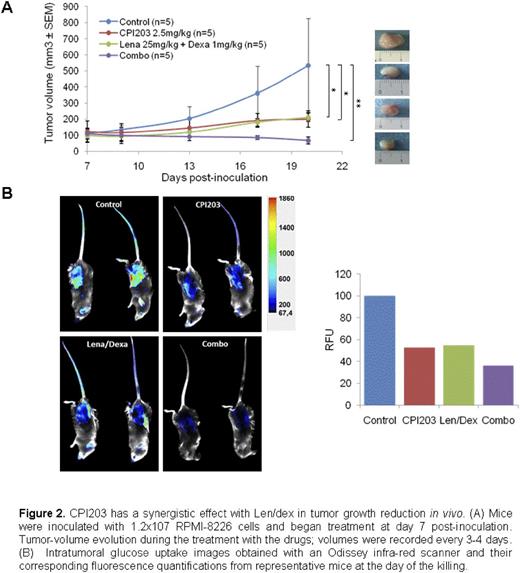Abstract
Introduction: Even with the use of novel drugs in patients with multiple myeloma (MM), relapse remains a challenge. Anti-myeloma activity of the immunomodulatory drug lenalidomide has been shown to rely on cereblon E3 ubiquitin ligase complex-dependent degradation of IRF4 and Ikaros, both required for MM cell survival. As these two factors are involved in the regulation of MYC transcription, we wanted to evaluate the effect of combining a MYC-interfering therapy with a lenalidomide and dexamethasone (Len/Dex) regimen.
Methods: Seven MM cell lines (ARP-1, JJN-3, U266, MM.1S, MM.1R, RMPI-8226 and KMM.1) were exposed to the BET bromodomain inhibitor CPI203 in the presence or absence of a standard dose of Len/Dex, followed by MTT assay, flow cytometry, western blot and gene expression arrays. Significant gene signatures were identified using gene set enrichment analysis (GSEA) v2.0 (Broad Institute at MIT).
These results were validated in primary cells derived from bone marrow of 9 patients with MM co-cultured with mesenchymal stromal cells plus IL-6, as well as in a SCID mouse xenotransplant model of MM. Mice were randomly assigned into cohorts of 5 mice each and received during 2 weeks (5 days on/2 days off) by intraperitoneal injection a twice daily dose of CPI203, daily dose lenalidomide plus twice weekly dexamethasone, the combination of both, or an equal volume of vehicle.
Results: We found CPI203 to exert a dose-dependent cell growth inhibition in all the cell lines tested (median response: 62.5%) (Figure 1) characterized by G1 cell cycle arrest and a concomitant inhibition of MYC and Ikaros signaling. Most interestingly, these effects were potentiated by the addition of Len/Dex treatment, with CI values ranging from 0.08 to 0.51. In the GSEA with an increasing profile analysis, the gene sets signatures related with MYC appeared downregulated in cells treated with the drug, and this downregulation was higher in cells treated with the combination of the three drugs. Moreover, genes associated with Ikaros and IRF4 also became downregulated after three drug treatment; these findings were confirmed by western blot analysis. Similarly, in 9 MM primary-stroma co-cultures, the drug combination evoked a 53% reduction in cell proliferation (Figure 1), and was associated with basal Ikaros mRNA levels (p=0.04).
Finally, in immunodeficient mice engrafted with MM cells, addition of CPI203 to Len/Dex therapy further decreased tumor burden, evidenced by a lower glucose uptake (Figure 2) and a simultaneous downregulation of MYC- and Ikaros-related genes by immunohistochemical analysis of the tumoral tissue after mice death.
Conclusion: The combination of a BET bromodomain inhibitor CPI203 with a lenalidomide-based regimen may represent a promising, rationally based therapeutic approach for patients with MM.
No relevant conflicts of interest to declare.
Author notes
Asterisk with author names denotes non-ASH members.



This feature is available to Subscribers Only
Sign In or Create an Account Close Modal